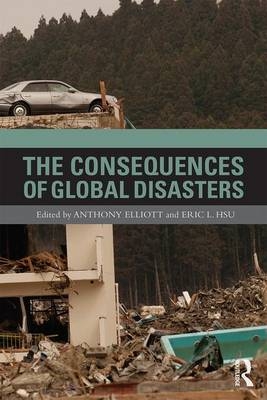
The Consequences of Global Disasters
Routledge (Verlag)
978-1-138-86115-2 (ISBN)
The Consequences of Global Disasters makes a distinctive contribution to the ever-expanding field of disaster research by developing a multi-contextual, multi-disciplinary and multi-methodological approach to the social analysis of disasters. Anthony Elliott and Eric L. Hsu have brought together a highly distinguished group of international contributors to focus on how people react to the unsettling effects of disasters, which come in a multitude of forms. Numerous contributors concentrate on the cultural, political and psychological ramifications of the 2011 Great East Japan earthquake and tsunami, but disasters in other contexts, such as Australia, China and Haiti, are considered as well.
By offering unique empirical, methodological and theoretical insights, The Consequences of Global Disasters sets an agenda for future developments in the field of disaster research and will be a key resource for students and scholars working in social science disciplines such as sociology, cultural studies, international relations, psycho-social studies, social work, Japanese studies and social theory.
Anthony Elliott is Director of the Hawke Research Institute and Executive Director of the Hawke EU Centre, where he is Research Professor of Sociology at the University of South Australia. He is also Global Professor (Visiting) of Sociology at Keio University, Japan. Eric L. Hsu is a Postdoctoral Research Fellow at the Hawke Research Institute and co-leader of the Community Reactions to Disasters research node at the Hawke EU Centre at the University of South Australia.
Part I: Expanding Forms of Disaster Research 1. ‘Broadening Horizons of Disaster Research’, Eric L. Hsu and Anthony Elliott 2. ‘"Flowers Will Bloom": How Japanese people mentally cope with the massive loss caused by the Great East Japan Earthquake’, Atsushi Sawai 3. ‘Death and Disaster: The catastrophe of suicide in Japan’, Sam Han and Nurul Amillin Hussain 4. ‘Sociology of Japanese Literature after the Great East Japan Earthquake: Analysing the disaster’s underrepresented impacts’, Takeshi Deguchi 5. ‘From "This is Not a Pipe" to "This is Not Fukushima": Global disaster and visual communication’, Kiyomitsu Yui 6. ‘Digital Disaster Communities’, Daniel Chaffee Part II: Disasters and Social Division 7. ‘Willingness of Australians to Contribute Now for Long Term Natural Disaster Mitigation’, Constance Lever-Tracy and Caroline Corkindale 8. ‘New Emotion, Action and Recognition of Migrants and Mediators after the Great East Japan Earthquake: Toward a new sociological theoretical approach to multicultural situations in Japan’, Kazuhisa Nishihara and Mari Shiba 9. ‘Ganbarō Nippon: Human insecurity, resilience and national identity after 3/11’, Giorgio Shani 10. ‘From Makeshift Tents to Apartment Units: Women rebuilding life in post-disaster Sichuan’, David Ip and Liyue Wu 11. ‘The "Face" of Earthquake Disaster Reporting: Inspecting Kahoku Shimpo’s sources of information’, I-Hsuan Lin Part Three: Social Theory and the Psycho-social Dimensions of Disasters 12. ‘To Dwell in Ambivalence; on the promise and dilemmas of Beck’s "Art of Doubt"’, John Cash 13. ‘Japanese Society after Great Earthquakes: From the viewpoint of the counter relation between "the social" and "the psychic"’, Masataka Katagiri 14. ‘Trauma, Subject and Society in Japan after 3.11’, Aiko Kashimura 15. ‘Rising Anxieties and the Longing for Ties: On the transformation of relationships and self in Japan’, Midori Ito 16. ‘Some Social Consequences of The Global Financial Crisis’, Bob Holton
| Erscheinungsdatum | 17.06.2016 |
|---|---|
| Reihe/Serie | Antinomies |
| Zusatzinfo | 5 Tables, black and white; 12 Line drawings, black and white; 7 Halftones, black and white; 19 Illustrations, black and white |
| Verlagsort | London |
| Sprache | englisch |
| Maße | 156 x 234 mm |
| Gewicht | 385 g |
| Themenwelt | Naturwissenschaften ► Biologie ► Ökologie / Naturschutz |
| Naturwissenschaften ► Geowissenschaften ► Geografie / Kartografie | |
| Sozialwissenschaften ► Soziologie | |
| ISBN-10 | 1-138-86115-4 / 1138861154 |
| ISBN-13 | 978-1-138-86115-2 / 9781138861152 |
| Zustand | Neuware |
| Haben Sie eine Frage zum Produkt? |
aus dem Bereich


